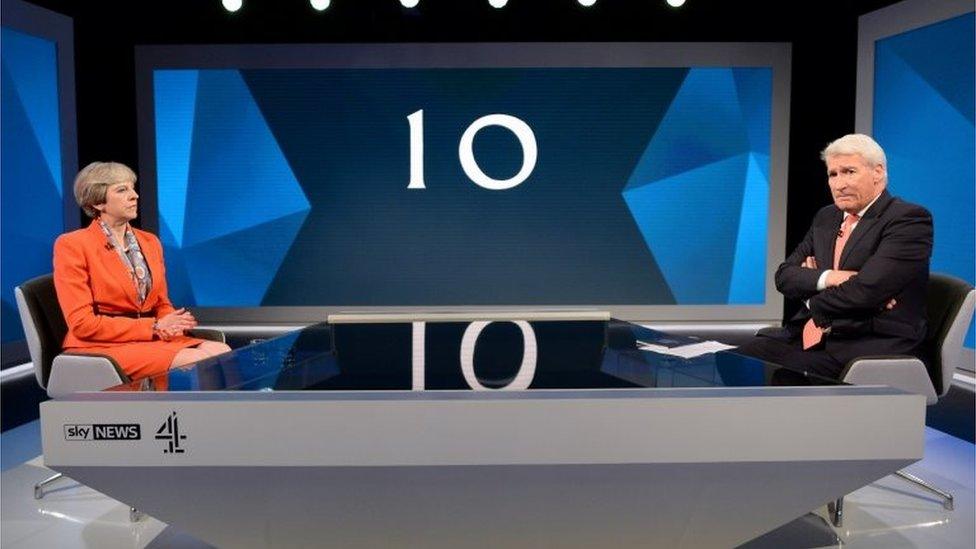General election 2017: Jeremy Corbyn and Theresa May face TV grilling
- Published
- comments
Theresa May and Jeremy Corbyn faced questions on Brexit and foreign policy from a live studio audience in a special general election programme.
Mr Corbyn was quizzed about his views on drone strikes, tax-raising plans and past campaigning in Northern Ireland.
Mrs May defended her social care reforms and was repeatedly asked if she had changed her mind on Brexit.
But the leaders did not appear together, as Mrs May declined to take part in a head-to-head encounter.
The Labour leader chose to be first up in the Battle for Number 10 show, which was broadcast by Sky News and Channel 4, after winning a coin toss.
In a Q&A with the studio audience, a small business owner attacked Mr Corbyn's "ruthless short-sighted policies" such as increasing corporation tax and putting VAT on private school fees.
"This country is badly divided between the richest and the poorest," the Labour leader replied, asking the man whether he was "happy" that children were going to school hungry and being taught in "supersized" classes.
Mr Corbyn was also pressed on his previous campaigning in Northern Ireland, with an audience member accusing him of attending a commemoration for members of the IRA, an Irish paramilitary group.
The Labour leader said he had been seeking a "dialogue" in the 1970s and 1980s and that he had marked a minute's silence "for everyone who died in Northern Ireland".

Analysis, by Laura Kuenssberg
A lot of people are only just starting to think about the election and they won't have sat through every bit of the TV event last night.
What they'll glean, though, from snippets and headlines is a sense of how this campaign has changed, written on the leaders' faces. Jeremy Corbyn, more comfortable, more assured, with better prepared answers. Theresa May, really having to explain herself.
And in this last stage the vulnerabilities are exactly where you'd expect. For Mr Corbyn it's on issues like security, his personal views on groups like the IRA. And for Mrs May, it's a Conservative prime minister facing tough questions over public services.

He would not be drawn on whether he would order a drone strike against a terrorist plotting overseas to attack the UK.
"I would want to know the circumstances," Mr Corbyn said.
"You can't answer a hypothetical question without the evidence."
He was also asked back-to-back questions on Brexit - one from a Leave voter calling for immigration controls and another from an unhappy Remain supporter.
He refused to set a target for migration numbers, saying Labour would act to prevent the undercutting of wages.
He then told the Remain supporter Labour had to "accept the reality of the referendum".
Queen questions
Mr Corbyn, a committed republican, was asked by Jeremy Paxman why abolishing the Monarchy was not in Labour's manifesto.
"It's not in there because we are not going to do it," he replied, adding that he had "a very nice chat with the Queen".
He said he described the death of Osama Bin Laden as a "tragedy" because he wanted him to be arrested and put on trial.
And he also defended using the term "friends" towards the militant Islamist group Hamas, calling it "inclusive language" at a meeting where he had been promoting the need for a two-state solution in the Middle East.

Mrs May was asked about the Tories' planned reforms to the way social care is funded, with a man in the audience describing the changes as a "dementia tax".
The PM confirmed an overall cap would be put on costs, which had not been included in the Tories' election manifesto, but did not say where this would be set.
She promised she would listen to charities and voters on where the cap should be, adding that the social care system would "collapse" without reform.
Replying to an audience member, she said spending on the NHS was increasing because she wanted a "first class" health service.
But she said it was only possible if there was a "really strong economy to pay for it".
"That's where the Brexit negotiations, but so much else, actually comes in," she said.
'Constant work' on migration
Mrs May defended her view that richer pensioners should not receive the winter fuel payment, saying she had met pensioners who agreed with her.
She was repeatedly asked by Mr Paxman whether she had changed her mind on Brexit - having campaigned for a Remain vote before the referendum.
He said: "What one's bound to say is that if I was sitting in Brussels and I was looking at you as the person I had to negotiate with, I'd think: 'She's a blowhard who collapses at the first sign of gunfire'."
But Mrs May said: "I take the view that we can make a success of Brexit."
The referendum had "drawn a line" under the Remain versus Leave debate, she said, adding that her decision to trigger the election was because of rival parties "trying to frustrate the process".
On immigration, the former home secretary defended the repeated failure to hit the government's target of reducing net migration to below 100,000.
She said there was "no single measure" to change immigration figures, describing it as a "constant work".
Other parties' reactions
Lib Dem Tim Farron said both leaders had committed a series of "blunders".
He claimed Mr Corbyn had made an unfunded commitment to lift the welfare cap, and Mrs May would not say how many people would be hit by a "dementia tax".
The SNP's Patrick Grady said: "I think we've found out why the prime minister has been so reluctant to take part in leaders' debates tonight."
Plaid Cymru criticised the lack of mentions of Wales, and the Green Party said Mrs May had "avoided the question" on her "unfair" social care reforms.

